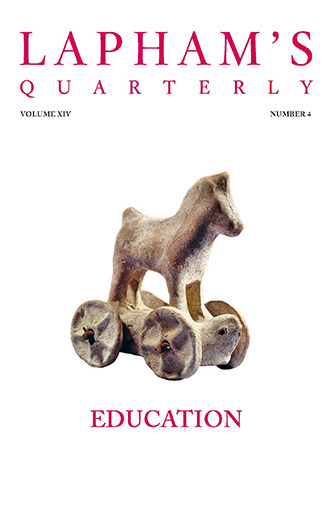King Olaf of Norway sent Thorarinn Nefjolfsson to Iceland on business of his. Thorarinn sailed out to sea and got such a fast, favorable wind that in eight sailing shifts, he sailed as far as reaching Eyrar in Iceland, went straight to the Althing, and got there when people were at the Law Rock, going straight to the Law Rock.
When people had delivered their legal proceedings there, then Thorarinn Nefjolfsson began to speak, “Four nights since I parted from King Olaf Haraldsson. He sent greetings to this land, to all the leading men and rulers of the country and as well to all the population of men and women, young and old, rich and poor, from God and himself, adding that he wishes to be your lord if you are willing to be his subjects, and each to be friends of the other and supporters in all good enterprises.”
People responded well to his speech. Everyone said they would gladly be friends of the king if he would be a friend of the people of this country.
Then Thorarinn began to speak, “This comes with the king’s greeting, that he would like to request in friendship from the people of the north of the country that they give him an island or outlying skerry that lies off Eyjafjordur known as Grimsey, wishing to offer in return whatever goods from his own country people may want to tell him about, and sent word to Gudmundr of Modruvellir to facilitate this business, since he has heard that Gudmundr has most say there.”
Gudmundr replies, “I am keen to have King Olaf’s friendship, and I consider that much more to my advantage than the outlying skerry that he asks for. Yet the king has not been correctly informed that I have more power over it than others, for it has now been made public land. We shall now have a meeting about it between ourselves, the people who have most profit from the island.”
Afterward people went to their booths. After this the people of Northern Iceland hold a meeting among themselves and discuss this business. Everyone put forward whatever their views were. Gudmundr was a supporter of the proposal, and many others sided with him. Then people asked why his brother Einarr had nothing to say about it.
“We feel he,” they say, “can see most clearly about most things.”
Then Einarr replies, “The reason I have had little to say about this business is that no one has called upon me to speak about it. But if I am to give my opinion, then I think that the course for us dwellers in this land is not to submit here to the taxes paid to King Olaf and all the burdens such as he has imposed on people in Norway. And we shall be causing this deprivation of freedom not only to ourselves, rather both to ourselves and our sons and all our families that inhabit this land, and this bondage will never go away or disappear from this land. So though this king may be a good man, as I firmly trust that he is, yet it will happen from now on as it has before now, when there is a change of ruler, that they turn out differently, some well, some badly. But if the people of this country wish to keep their freedom, which they have had since this land was settled, then it will be best to grant the king no foothold on it, either in possession of land here or by payment from here of specific taxes that may be interpreted as acknowledgment of allegiance. But this I declare to be quite proper, that people should send the king friendly gifts, those who wish to, hawks or horses, hangings or sails, or other such things that are suitable to send. It is making good use of these things if they are rewarded by friendship. But as for Grimsey, there is this to say, if nothing is transported from there that can be used as food, then a host of men could be maintained there. And if a foreign army is there and they come from there with longships, then I think many a cottager would feel that oppression was at hand.”
And when Einarr had said this and mentioned all the possible outcomes, then all the people were converted to the one opinion, that this must not be granted. Thorarinn saw then what the outcome of his errand on this business would be.
From the Heimskringla. Born to a prominent Icelandic family in 1179, Sturluson was elected lawspeaker of the annual Althing in 1215. Three years later he was invited to Norway by Haakon IV, who sought Sturluson’s help in annexing Iceland. Sturluson agreed but, on returning home, did little to advance Haakon’s interests, instead composing historical and poetic works. In 1241 the king had Sturluson assassinated. “Thus,” wrote scholar Lee M. Hollander, “his death may be called the prelude to Iceland’s loss of independence after four hundred years of republican, or at least oligarchic, rule.”
Back to Issue


